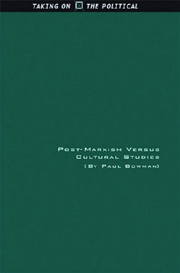One - Cultural Studies and Post-Marxism
Published online by Cambridge University Press: 12 September 2012
Summary
On the day of [The Centre for Cultural Studies at Birmingham University's] opening, we received letters from the English department saying that they couldn't really welcome us; they knew we were there, but they hoped we'd keep out of their way while they got on with the work they had to do. We received another, rather sharper letter from the sociologists saying, in effect,‘…we hope you don't think you're doing sociology, because that's not what you're doing at all’.
(Stuart Hall 1990: 13)Introduction: Of Deconstruction into Politics
Post-Marxism and cultural studies both explicitly engage with and take on the question of the political, of political engagement, and of ethical, political and university responsibility. Both are interested in intervention. But their relationship is far from simple, and the intellectual and political costs of ignoring its complexity are high. This chapter will explain why. First, let us examine the usual view. In this, the importance of post-Marxist political theory for cultural studies is regularly affirmed (Morley and Chen 1996: 1–2; Hall 1996c: 40; Sparks 1996: 90–5; Daryl Slack 1996: 117–22). Rarely has anything like the reverse been suggested. However, the need for just such a revaluation, or inversion and subsequent displacement of this schema is great. The usual interpretation of the relationship between cultural studies and post-Marxism is regularly conveyed in works of or about cultural studies (it is rarely mentioned or acknowledged within post-Marxist scholarship), and it has several often problematic but nonetheless important dimension.
- Type
- Chapter
- Information
- Post-Marxism Versus Cultural StudiesTheory Politics and Intervention, pp. 1 - 54Publisher: Edinburgh University PressPrint publication year: 2007



